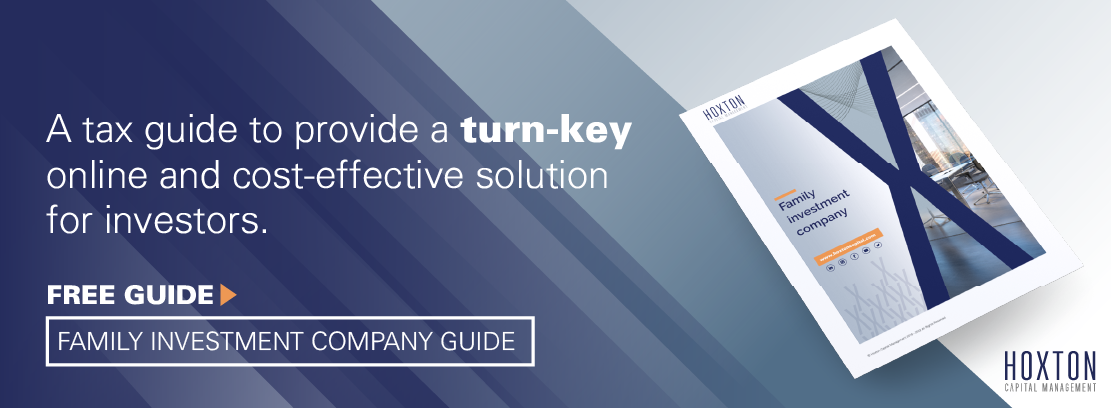Family Investment Company (FIC)
A family investment company (FIC) is a type of private company that wealthy families use to manage and invest their assets. In the UK, FICs are becoming increasingly popular for tax-efficiently passing on wealth to future generations.

What differentiates FICs from other investments?
Our in-house tax team explored how several key features differentiate FICs from other types of investment vehicles:
- Firstly, they are owned and controlled by the family rather than external investors or shareholders. This allows the family to decide how their assets are invested and managed, ensuring that the wealth remains within the family.
-
Secondly, FICs can hold a wide range of assets, including shares in other companies, property, and other investments. This flexibility makes them an attractive option for families looking to diversify their wealth and protect it from potential risks.
The Main Benefits of an FIC
One of the main benefits of using an FIC is the potential to reduce the tax paid on wealth passed down to future generations. In the UK, inheritance tax is levied on the value of an estate above a certain threshold (currently £325,000). Using an FIC, it is possible to structure the ownership and distribution of assets to minimise the amount of tax payable.
There are several other considerations to bear in mind when setting up and operating an FIC. For example, ensuring that the company is appropriately structured and governed and that any investments made are consistent with the family’s long-term goals and risk appetite is essential.
Summary
In summary, a family investment company can be a valuable tool for managing and investing family wealth in the UK, providing flexibility, control, and the potential for tax efficiency. However, it is crucial to seek professional advice and ensure that the company is set up and operated in a way that meets the family’s needs and complies with relevant laws and regulations.
Download our free Family Investment Company Guide to learn more:
Could a Family Investment company (FIC) be for me?
A privately held company which holds investments rather than doing any trading business. It is called a “Family” Investment Company, as all the shares are usually owned by family members or Trusts set up for the benefit of that family.
Usually, FICs hold a mixture of cash, residential and/or commercial properties and/or investments, usually in listed companies. On occasion, FICs may also ‘own’ loans made to other family companies (often trading companies).
Anyone with money, property, or investments to invest and would like to do so using a company structure. They will often be used by business owners familiar with how companies operate.
This depends on the assets. Cash can be added through a share subscription, though this is unusual. More commonly, money is added through a director’s loan so that the directors personally lend money to the company. Properties or investments can be transferred to an FIC, though this can give rise to capital gains tax implications and stamp duty land tax in the case of properties. Still, tax planning may be available here.
Often FICs will be set up with multiple classes of shares, each designated by a different alphabet letter. The other classes of shares can each have various rights to dividends, additional capital rights (i.e., different capital amounts being due on the company being sold or wound up), other voting rights, and various rights to appoint directors.
Where shares have been set up with multiple share classes, often individual family members will own a different class of share each. These shares can be owned personally by the various family members, or in some situations; they can be held in trust for them. One advantage of using multiple-class shares is that the directors may pay different amounts of dividends to the various family members.
By way of lifetime gifts or on death following the shareholder’s Will (or the intestacy rules if there is no Will in place). Shares can be given outright to individuals or held in trust for their benefit.
If the shares have any value, they will be subject to the usual inheritance tax rules. This means that if the person giving away the shares survives the gift by more than seven years, there is no inheritance tax to pay. However, if they do not survive a gift by seven years, then the gift could be subject to inheritance tax on their death, calculated on the value of the shares at the date of the gift. FIC shares left by Will form part of a deceased’s estate, and if the inheritance tax threshold is exceeded, they will be subject to 40% inheritance tax on their market value.
Lifetime gifts of FIC Shares will be subject to capital gains tax if the shares have increased in value since they were acquired. Any gain will be taxed at 10% or 20% (based on the current rates), depending on the individual’s income tax band. Gifts on death are not subject to capital gains tax, as a person’s death washes away all capital gain. This means that the person receiving the shares (or the trustees) gets the shares at the date of death value.
There is no minimum value for setting up an FIC. However, consideration should be given to setting it up and the annual administration costs involved in company compliance and reporting. Sometimes FIC is set up with a relatively modest amount, with the aim that further assets can be added later. Many advisors suggest that FIC are not particularly economical if the value is below £1m, but this is not a hard and fast rule.
FICs cannot be ringfenced against divorce, but it can be difficult for the company’s assets to be used as part of a shareholder’s divorce settlement or civil partnership dissolution. Provision to help protect an FIC against relationship breakdown could be made in the FIC Articles, which restrict how shares can be transferred and give other shareholders a right to buy back the shares if they were to end up out of the family’s hands.
Pre- or post-nuptial agreements should also be considered. The consequence of these provisions is that the value of the shareholding may be limited in the event of divorce, which can protect against their forming part of a divorce settlement. For more information about family businesses and divorce, see our recent article.
FICs can be structured so that different classes of shares receive different amounts of capital on a winding up. For example, classes of shares can be set up that only receive their nominal value, whereas other classes of shares can be set up to receive all the future increases in the company’s value. This enables future growth to be given away, so that it will not be subject to inheritance tax in the hands of the original Shareholder.
Unlike trading companies, FICs are subject to inheritance tax on the total value of the shares. However, minority ownership discounts can apply, considering the minority owner’s lack of control over the company. For example, if a shareholder only owns 10% of the Company, a discount more than 50% may apply on the value of their shares (based on the company’s net asset value). This discount can be useful for general family estate planning and result in substantial inheritance tax savings.
There is usually no immediate tax consequence of adding large cash sums to an FIC, whereas trusts are generally limited to a person’s available nil rate band (currently up to £325k). Otherwise, immediate inheritance tax may be due.
If dividend income is to be retained within a (discretionary) trust, it would be subject to income tax and further tax when paid out of the trust. However, if this income was retained within an FIC, it would not be taxed.
FICs are subject to double taxation when non-dividend profits are extracted (i.e., rental income, for example, would be taxed at the Corporation Tax rate (currently 19%, but 24% from the next tax year 2023-24) and then taxed again at the dividend rate (now 8.75%, 33.75% or 39.35%) when extracted from an FIC. In contrast, it would only be subject to marginal income tax rates if paid out of a trust.
Limited companies usually have higher compliance requirements than trusts, though both must usually submit tax returns.
Unlimited companies are often used for FICs, as they have lower Companies House reporting requirements, enabling details to be kept out of the public domain. In addition, with investment companies, the limited liability protection that limited companies provide is of little or no benefit. However, it may be worth noting that if it is intended that some or all the shares are held in trust, then professional trustees may refuse to be appointed to hold an unlimited company. Otherwise, they would potentially be opening themselves up to unlimited liability, which could even arise without their consent if the directors exposed the company to risk.
FICs, like other companies, have ongoing compliance requirements. Tax returns must be submitted each year, and accounts and confirmation statements must be filed each year with Companies House.
If the shareholders agree, they can change the company’s Articles of Association and restructure the shares. If they are not in agreement, it will depend on whether they have enough votes to do that under the existing Articles. For this reason, it is better to put changes in effect whilst few shareholders can exert control rather than after shares have been diluted by passing them down the generations to multiple family members.
How can we help you?
If you would like to speak to one of our advisers, please get in touch today.

